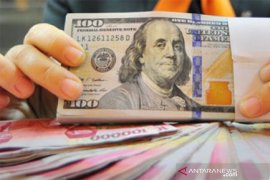"Indonesia`s 14 percent depreciation has been caused due to external factors and especially from the U.S. dollar strengthening and the U.S. Federal Reserve`s plan to increase interest rates," Martowardojo said.Jakarta (ANTARA News) - The Rupiah has weakened to Rp14.000 per U.S. dollar due to global financial dynamics, said Indonesias Central Bank Governor, Agus Martowardojo, on Wednesday.
"The Rupiahs weakening is actually a part of global conditions," said Martowardojo on the sidelines of the Indonesian Banking Expo (IBEX) being held at the Jakarta Convention Center.
He added that the depreciation in the Rupiahs exchange value is relatively better than other countries currency depreciation, such as Brazil, where the depreciation reached 44 percent during January to August and 25 percent in Turkey, while Indonesia is only 14 percent.
"Indonesias 14 percent depreciation has been caused due to external factors and especially from the U.S. dollar strengthening and the U.S. Federal Reserves plan to increase interest rates," Martowardojo pointed out.
The Rupiahs volatility has also been affected by several factors, such as the uncertainty of when the Fed will raise interest rates and the Chinese Yuan's devaluation policy.
"In general, Indonesias Rupiah is still in a good condition, and we are expecting this will only be a temporary thing. The Bank of Indonesia (BI) is always in the market and maintains the volatility in the safe zone," said Martowardojo.
As the central bank, BI has carried out interventions, which has helped reduce the states foreign reserves as used by the government to pay foreign debt.
Indonesias foreign exchange reserves till August were recorded at 105.3 billion U.S. dollars, down 2.3 billion U.S. dollars, compared with the final position by the end of June at 107.6 billion U.S. dollars.
The state of Indonesias foreign exchange till August is still adequate to finance 7.1 months of import or 6.9 months imports and payment for the states foreign debt, which is above the international standard for adequacy and above the international standard for three months worth of imports.(*)
Editor: Heru Purwanto
Copyright © ANTARA 2015










